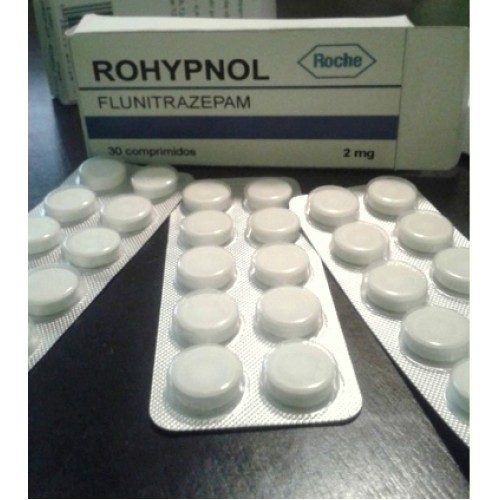Treatment Methods for Rohypnol
 Rohypnol also called flunitrazapam is a powerful sedative drug used to induce sleep and treat insomnia. This drug is illegal in the United States, but is still legal in other countries. Rohypnol comes in a pill form and when dissolved in a drink it is odorless and tasteless. When mixed with alcohol it can cause a person to black out and give up control, which can lead to “date rape.” It can also cause amnesia or even death. When ingested it can take 20 minutes to feel its effects and these effects can last anywhere from 8-12 hours. A person under the influence of Rohypnol can look drunk; have blood shot eyes, slurred speech, and lack of coordination. Rohypnol can be detected with a drug test for up to 60 hours of being ingested. Some street names are: Date rape drug, La roche, R2, Rib, Roach, Roofenol, Roofies, Rope, Rophies, Ruffies, The forget pill, Mexican Valium.
Rohypnol also called flunitrazapam is a powerful sedative drug used to induce sleep and treat insomnia. This drug is illegal in the United States, but is still legal in other countries. Rohypnol comes in a pill form and when dissolved in a drink it is odorless and tasteless. When mixed with alcohol it can cause a person to black out and give up control, which can lead to “date rape.” It can also cause amnesia or even death. When ingested it can take 20 minutes to feel its effects and these effects can last anywhere from 8-12 hours. A person under the influence of Rohypnol can look drunk; have blood shot eyes, slurred speech, and lack of coordination. Rohypnol can be detected with a drug test for up to 60 hours of being ingested. Some street names are: Date rape drug, La roche, R2, Rib, Roach, Roofenol, Roofies, Rope, Rophies, Ruffies, The forget pill, Mexican Valium.
Why is Rohypnol Called the Date Rape Drug?
Amnesia is an expected pharmacologic effect of benzodiazepines. Rohypnol causes partial amnesia; individuals are unable to remember certain events that they experience while under the influence of the drug. However, this effect is particularly dangerous when Rohypnol is used illicitly to aid in sexual assault. Victims may not be able to clearly recall the assault, the assailant, or the events surrounding the assault.
ROHYPNOL EFFECTS
Rohypnol has been used to commit sexual assaults because it renders the victim incapable of resisting, giving it the reputation of a “date-rape” drug.
Rohypnol users often describe its effects as “paralyzing.” The effects start twenty to thirty minutes after taking the drug, peak within two hours and may persist for eight or even twelve hours. A person can be so incapacitated (made unable to act) they collapse. They lie on the floor, eyes open, able to observe events but completely unable to move. Afterwards, memory is impaired and they cannot recall any of what happened.
The person experiences loss of muscle control, confusion, drowsiness and amnesia.
Rohypnol is sold in Europe and Latin America as a sleeping pill, but it is illegal in the United States.
Short-term effects:
- Sleepy, relaxed, and drunk feeling
- Blackouts
- Loss of memory
- Dizziness and disorientation
- Nausea
- Inability to move or communicate
Long-term effects:
- Can impair learning ability, attention, and memory
- Physical and psychological dependence.
Treatment Methods for Rohypnol
Professional rehab is the safest and most effective way to address Rohypnol abuse, and below are four common ways an addiction is treated.
Tapered Detox
To break physical dependence, it is important to reduce Rohypnol dosage gradually under medical supervision. Abruptly stopping or decreasing use can result in a protracted withdrawal syndrome, which the National Institute on Drug Abuse says can cause seizures, convulsions, psychiatric problems and increases in blood pressure and heart rate. A 2011 edition of the Journal of the Oklahoma State Medical Associated also notes that these seizures can involve violent muscle contractions, unconsciousness and possibly death, but a gradual detox provides more comfort as it minimizes associated health risks.
Integrated Mental Health Care
Rohypnol is a mental health drug, so people may use it to self-medicate undiagnosed disorders. Rehab centers typically provide mental health screenings, diagnoses and integrated treatment for co-occurring disorders. Furthermore, doctors commonly prescribe benzodiazepines and other sedatives for anxiety, panic and sleep disorders, and holistic and therapeutic approaches are often used to treat recovering addicts with these conditions. A 1998 edition of the journal Addictive Behaviors notes that anxiety disorders often lead to substance abuse.
Behavioral Therapies
Cognitive Behavioral Therapy (CBT) and Dialectical Behavioral Therapy (DBT) can improve addicts’ behavior. CBT targets negative and maladaptive thought patterns as it promotes positive emotions and beliefs, while DBT helps patients address conflicting impulses so they can make healthy choices. Both therapies treat substance abuse, anxiety disorders and other mood issues. Therapy also empowers patients to identify, avoid and mitigate cues that trigger drug cravings.
Individual and Group Counseling
Addiction and mental health counseling occur in both individual and group settings. One-on-one treatment sessions may address unresolved trauma, unconscious conflicts and specific struggles, while group sessions often involve training in life skills, stress management, conflict resolution and social connections. Group counseling also gives patients the chance to share their thoughts and experiences to develop social support, which are important for lasting recovery.
Rohypnol abuse has serious risks. Per the Drug Abuse Warning Network, in 2011 sedatives like Rohypnol accounted for more than half a million medical emergencies, which is a 124% increase since 2004. Furthermore, the Journal of Clinical Psychiatry stated in 2005 that benzodiazepines are often a secondary drug, which means Rohypnol users may also have other addiction issues. By using a variety of treatment methods, rehab centers can empower patients to overcome co-occurring addictions and mental health disorders.

No comments